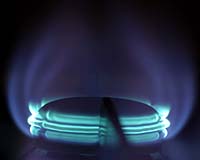 |
Copenhagen (AFP) April 5, 2011 Large, untapped oil and gas reserves have been attracting oil firms to Greenland, which hopes the resources will help speed up its independence, but there is unwanted attention from environmentalists. "We have never seen as much interest for oil exploration in Greenland," said Joern Skov Nielsen, who heads the territory's oil and minerals office. Greenland's government in November distributed seven prospecting blocs in the Baffin Bay, west of Greenland, among eight major oil companies, including ConocoPhillips of the United States, Anglo-Dutch giant Shell and Scotland's Cairn Energy. According to the US geological survey (USGS), more than a fifth of the world's undiscovered oil and gas resources lie north of the Polar circle. Some 84 percent of these are located at sea, and they would altogether represent 13 percent of the world's oil resources and 30 percent of the planet's natural gas. Those estimates put the oil reserves in Greenlandic waters at some 52 billion oil barrels, 17 billion of which would lie between the island's west coast and the eastern coast of Canada's Baffin island, and 31.4 billion to Greenland's north-east. Cairn Energy, which heads the race to capture Greenlandic oil and gas, drilled three oil wells last year and deemed them successful. Its operations were interrupted by Greenpeace for two days, but it was not enough to deter the company, which will be drilling four more wells this year. "2011 was our third year of operation in Greenland and we will invest some 500 million dollars there this year (350 million euros), bringing our total investment there to more than one billion dollars," the company's commercial director Simon Thomson told AFP. And Greenland's fossil fuels are not only promising for the companies rushing to exploit them. The Greenlandic government is also hoping oil and gas will lead the way to gaining economic and political independence from Denmark. "Oil has the greatest potential to help us achieve economic independence," said Ove Karl Berthelsen, minister for industry and mineral resources minister of Greenland, where most of the 56,000 mostly Inuit inhabitants survive on fishing and subsidies from Copenhagen. The head of Greenland's government, Kuupik Kleist, told a conference of Inuit leaders in Ottawa in February offshore oil and gas should even become the island's main economic activity. "The status quo is not acceptable for Greenland. We do not want to be dependent solely on traditional activities like fishing and hunting," he said. Still, he said, the Greenlandic government is conscious of the risks associated with the exploitation of fossil fuels. "It is essential to find a balance between economic development and the other interests of society ... and to involve the population in the decision making process." Berthelsen told AFP that Nuuk "does not want oil exploration to destroy our main resource, fishing" and the Greenland government tightened regulations around deep-sea drilling following the recent oil spill in the Gulf of Mexico. Encouraged by the interest in its last licensing round, Greenland will launch a new one at the end of this year for the north-east of the island. "We have great, great hopes for that region where the possibility of finding fossil fuels is very high, up to 70 percent," said Nielsen, the head of the minerals office. Global warming "could turn the region into an Eldorado", he said, explaining it had the same geology as northwestern Norway, where important discoveries have been made. But environmental organisation Greenpeace does not see the same promises in Greenland's untapped oil, calling it "a suicidal race for fossil fuels" in what is an already fragile environment. "It has to be stopped, because Greenland's government does not have the capacity to control the companies' drilling," Mads Flarup Christensen of Greenpeace Nordic told AFP. The environmental organisation is being arrogant, according to Nielsen. "We can very well insure regular controls with the help of Norwegian and Canadian experts, just as we did with Cairn's first drillings," he said. Kleist went even further. "Greenpeace -- just like in its campaigns against the seal hunt -- is once again putting a break on chances for a better future" for the Inuit of Greenland, he said.
Share This Article With Planet Earth
Related Links Powering The World in the 21st Century at Energy-Daily.com
 Paraguay, Uruguay pitch for oil bonanza
Paraguay, Uruguay pitch for oil bonanzaMontevideo, Uruguay (UPI) Apr 4, 2011 Paraguay and Uruguay are making independent bids for investors to take more interest in recent exploration that each hopes will yield commercially viable quantities of oil and natural gas. Uruguay's state-run oil and gas company ANCAP said it hoped that recent discovery of subterranean rock formations could enable the country to become a producer of substantial quantities of shale oil o ... read more |
|
| The content herein, unless otherwise known to be public domain, are Copyright 1995-2010 - SpaceDaily. AFP and UPI Wire Stories are copyright Agence France-Presse and United Press International. ESA Portal Reports are copyright European Space Agency. All NASA sourced material is public domain. Additional copyrights may apply in whole or part to other bona fide parties. Advertising does not imply endorsement,agreement or approval of any opinions, statements or information provided by SpaceDaily on any Web page published or hosted by SpaceDaily. Privacy Statement |